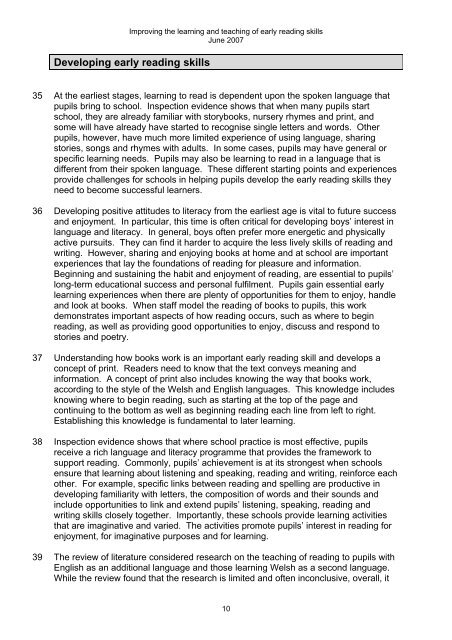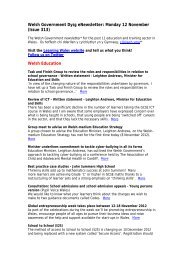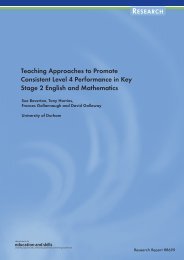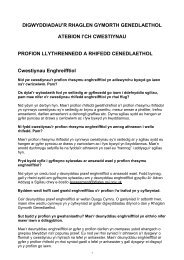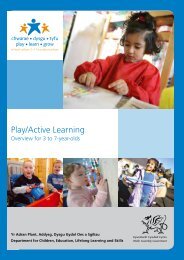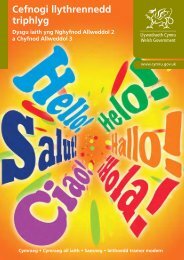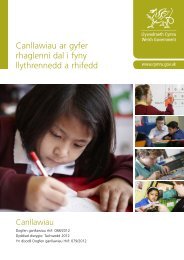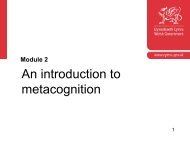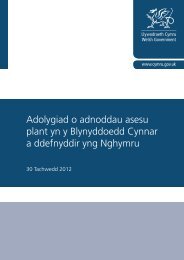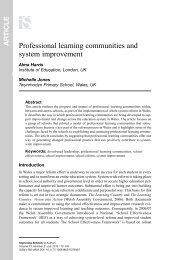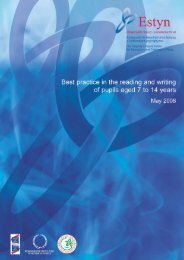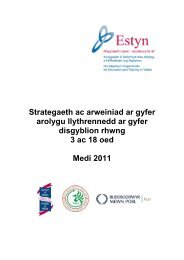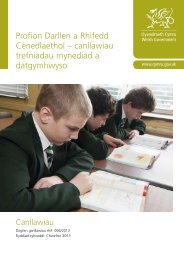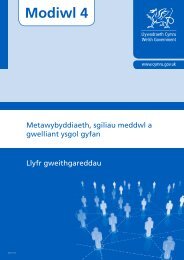Improving the learning and teaching of early reading skills - Estyn
Improving the learning and teaching of early reading skills - Estyn
Improving the learning and teaching of early reading skills - Estyn
You also want an ePaper? Increase the reach of your titles
YUMPU automatically turns print PDFs into web optimized ePapers that Google loves.
<strong>Improving</strong> <strong>the</strong> <strong>learning</strong> <strong>and</strong> <strong>teaching</strong> <strong>of</strong> <strong>early</strong> <strong>reading</strong> <strong>skills</strong><br />
June 2007<br />
Developing <strong>early</strong> <strong>reading</strong> <strong>skills</strong><br />
35 At <strong>the</strong> earliest stages, <strong>learning</strong> to read is dependent upon <strong>the</strong> spoken language that<br />
pupils bring to school. Inspection evidence shows that when many pupils start<br />
school, <strong>the</strong>y are already familiar with storybooks, nursery rhymes <strong>and</strong> print, <strong>and</strong><br />
some will have already have started to recognise single letters <strong>and</strong> words. O<strong>the</strong>r<br />
pupils, however, have much more limited experience <strong>of</strong> using language, sharing<br />
stories, songs <strong>and</strong> rhymes with adults. In some cases, pupils may have general or<br />
specific <strong>learning</strong> needs. Pupils may also be <strong>learning</strong> to read in a language that is<br />
different from <strong>the</strong>ir spoken language. These different starting points <strong>and</strong> experiences<br />
provide challenges for schools in helping pupils develop <strong>the</strong> <strong>early</strong> <strong>reading</strong> <strong>skills</strong> <strong>the</strong>y<br />
need to become successful learners.<br />
36 Developing positive attitudes to literacy from <strong>the</strong> earliest age is vital to future success<br />
<strong>and</strong> enjoyment. In particular, this time is <strong>of</strong>ten critical for developing boys’ interest in<br />
language <strong>and</strong> literacy. In general, boys <strong>of</strong>ten prefer more energetic <strong>and</strong> physically<br />
active pursuits. They can find it harder to acquire <strong>the</strong> less lively <strong>skills</strong> <strong>of</strong> <strong>reading</strong> <strong>and</strong><br />
writing. However, sharing <strong>and</strong> enjoying books at home <strong>and</strong> at school are important<br />
experiences that lay <strong>the</strong> foundations <strong>of</strong> <strong>reading</strong> for pleasure <strong>and</strong> information.<br />
Beginning <strong>and</strong> sustaining <strong>the</strong> habit <strong>and</strong> enjoyment <strong>of</strong> <strong>reading</strong>, are essential to pupils’<br />
long-term educational success <strong>and</strong> personal fulfilment. Pupils gain essential <strong>early</strong><br />
<strong>learning</strong> experiences when <strong>the</strong>re are plenty <strong>of</strong> opportunities for <strong>the</strong>m to enjoy, h<strong>and</strong>le<br />
<strong>and</strong> look at books. When staff model <strong>the</strong> <strong>reading</strong> <strong>of</strong> books to pupils, this work<br />
demonstrates important aspects <strong>of</strong> how <strong>reading</strong> occurs, such as where to begin<br />
<strong>reading</strong>, as well as providing good opportunities to enjoy, discuss <strong>and</strong> respond to<br />
stories <strong>and</strong> poetry.<br />
37 Underst<strong>and</strong>ing how books work is an important <strong>early</strong> <strong>reading</strong> skill <strong>and</strong> develops a<br />
concept <strong>of</strong> print. Readers need to know that <strong>the</strong> text conveys meaning <strong>and</strong><br />
information. A concept <strong>of</strong> print also includes knowing <strong>the</strong> way that books work,<br />
according to <strong>the</strong> style <strong>of</strong> <strong>the</strong> Welsh <strong>and</strong> English languages. This knowledge includes<br />
knowing where to begin <strong>reading</strong>, such as starting at <strong>the</strong> top <strong>of</strong> <strong>the</strong> page <strong>and</strong><br />
continuing to <strong>the</strong> bottom as well as beginning <strong>reading</strong> each line from left to right.<br />
Establishing this knowledge is fundamental to later <strong>learning</strong>.<br />
38 Inspection evidence shows that where school practice is most effective, pupils<br />
receive a rich language <strong>and</strong> literacy programme that provides <strong>the</strong> framework to<br />
support <strong>reading</strong>. Commonly, pupils’ achievement is at its strongest when schools<br />
ensure that <strong>learning</strong> about listening <strong>and</strong> speaking, <strong>reading</strong> <strong>and</strong> writing, reinforce each<br />
o<strong>the</strong>r. For example, specific links between <strong>reading</strong> <strong>and</strong> spelling are productive in<br />
developing familiarity with letters, <strong>the</strong> composition <strong>of</strong> words <strong>and</strong> <strong>the</strong>ir sounds <strong>and</strong><br />
include opportunities to link <strong>and</strong> extend pupils’ listening, speaking, <strong>reading</strong> <strong>and</strong><br />
writing <strong>skills</strong> closely toge<strong>the</strong>r. Importantly, <strong>the</strong>se schools provide <strong>learning</strong> activities<br />
that are imaginative <strong>and</strong> varied. The activities promote pupils’ interest in <strong>reading</strong> for<br />
enjoyment, for imaginative purposes <strong>and</strong> for <strong>learning</strong>.<br />
39 The review <strong>of</strong> literature considered research on <strong>the</strong> <strong>teaching</strong> <strong>of</strong> <strong>reading</strong> to pupils with<br />
English as an additional language <strong>and</strong> those <strong>learning</strong> Welsh as a second language.<br />
While <strong>the</strong> review found that <strong>the</strong> research is limited <strong>and</strong> <strong>of</strong>ten inconclusive, overall, it<br />
10


